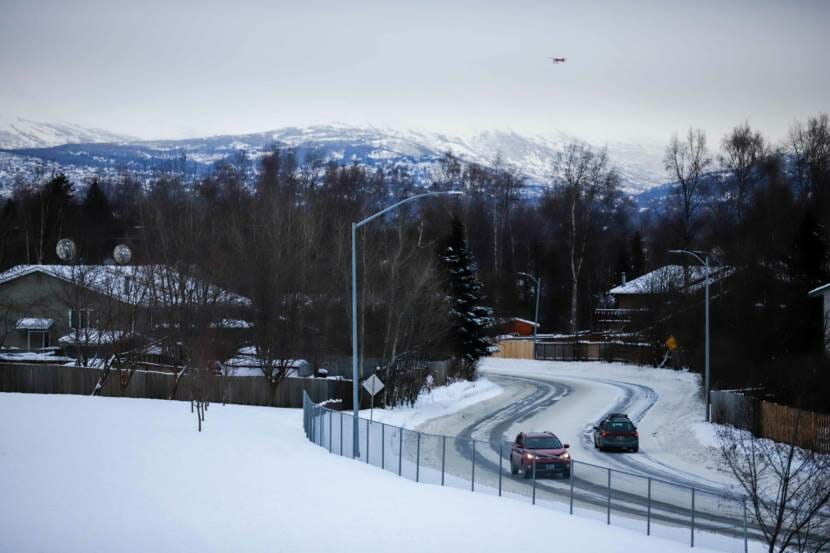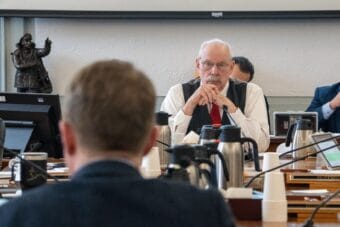
Critical state jobs are going unfilled this year. That’s led to unplowed roads, ferries tied up at the dock and slowdowns in the court system. We spoke to Anchorage Daily News reporter James Brooks, who has been reporting on the issue.
Listen here:
The following transcript has been lightly edited for clarity.
Kavitha George: Could you describe where we’re seeing vacancies in state jobs?
James Brooks: They’re occurring in different places throughout the state. I do want to say it’s not consistent across all departments. But where I’ve seen it the most has been in the Department of Transportation, with plow drivers, ferry workers, and people with technical skills, people like mechanics, or sailors who have to have specific training. So generally, if it’s a technical skill, it’s in short supply and difficult to hire for.
Kavitha George: And what are the impacts being reported as a result of those vacancies?
James Brooks: With fewer plow drivers on the roads we’re seeing it take longer to remove snow from the roads. Roads are staying icier longer than they would if things were at full staff. In Fairbanks, for example, during the big winter storm, DOT described an all-hands-on-deck situation where they brought in drivers from different areas, like moving people from the Dalton Highway down into Fairbanks to remove snow and ice. And if they had had more drivers in the area, maybe they would have been able to act more quickly to deal with the situation. In Homer, for example, they had to shift people down from Soldotna. And that takes time and overtime. And sometimes people simply aren’t available.
Kavitha George: Do you have a sense of why we’re seeing these vacancies right now? Does it fit into a larger picture of labor issues that we’ve been seeing during the pandemic?
James Brooks: It seems to be fitting into the same kinds of things that we’re seeing nationwide, where there’s a significant demand for particular jobs. And companies are just having a hard time filling those jobs for a variety of reasons.
Kavitha George: You also reported that overall, the number of state employees is about the same between this year and last year. So is it just that the particular positions that aren’t filled are these really important ones, like plow drivers, where the impacts are felt pretty strongly?
James Brooks: It’s down about 200 employees statewide out of 15 or 16,000. So while that’s not a big number in absolute terms, it’s where the vacancies are, that’s having the biggest effect. Because if there are fewer workers in the courthouse, for example, it might take longer to process legal filings. If there are fewer plow drivers on the road, it might take longer to remove snow. And if there just aren’t ferry workers, well, there’s minimum standards to sail a ferry so that ferry might not be able to run.
Kavitha George: Got it. What are some steps that the state is taking to try to address the vacancies, to get these services back on track?
James Brooks: The Alaska State Troopers and the Alaska Department of Corrections, they’ve had pretty well established nationwide recruiting efforts. And from what I’ve been able to find they haven’t been hit as hard as other departments are in terms of staffing shortages. But in agencies where there isn’t, as well established a national recruiting effort. That’s where I’m seeing more of these shortages.
And so we’re seeing the Department of Transportation step up its recruiting efforts, Department of Law said they’re taking some extra steps to accelerate the process of bringing people on board when they’re accepted. Back last year, when the pandemic began, the governor’s office instituted a hiring freeze, because with oil prices plunging, they weren’t sure where the budget would land. In October that hiring freeze was mostly limited — there’s still some extra approval required for particular high level positions — but by and large, the state has gone back to normal hiring practices, and then is launching those extra recruiting efforts.
The ferry system, for example, is ramping up a new recruitment program. And the goal is to get more people working in the ferry system. And that’s pretty important. Because while there’s not that many ferries operating right now, summer is coming up, and there will be a lot of ferries running. And if they don’t have enough crew to operate right now, what’s going to happen in the summer when there’s even more demand?
Kavitha George: So I guess we’ll just kind of have to wait and see over the next few months and into the summer.
James Brooks: Exactly. If the hiring struggles continue, then we might see the state start to address some long term issues that employees have said have been an issue. For example, after my story published, I had employees come to me and say the lack of a pension program is an issue now. Because remember, about a decade and a half ago, the state got rid of its pension in favor of a 401K-style retirement system. Well, the problem with that type of retirement system makes it very easy for employees to leave the state without penalty. And without any kind of retirement penalty. A pension tends to keep employees in place longer and reduces turnover.
Kavitha George: I mean, something we’ve been seeing among businesses that have been facing hiring struggles is they have to increase pay or benefits. Is there any kind of move towards that at the state level?
James Brooks: Most of the state’s employees are unionized. And so their pay and benefits are set by union contracts. Some of those contracts are under negotiation right now. And so I’m going to be keeping an eye on how those negotiations go and see if there is pressure to increase pay in order to accommodate for inflation and attract workers.



